The Upper Tana-Nairobi Water Fund hosted for a South-South exchange in Malawi
30 January 2023
The Global Water Partnership defines Integrated Water Resource Management (IWRM) as a process that promotes the development and management of water, land, and related resources to maximise the economic and social welfare of communities without compromising the sustainability of vital aquatic ecosystems and the services they provide.
Rapidly growing populations are placing increasing pressure on African ecosystems and infrastructure to keep up with growing food and water demand. Access to water remains a major challenge for smallholder farmers. Lack of both small- and large-scale infrastructure to augment water supply results in inadequate supply for household and irrigation use. Fragmented governance and uncoordinated resource planning nationally and regionally in shared river basins result in uneven distribution of water resources, worsening availability. Poor regulation and monitoring of water quality means that, when water is available, water resources are often polluted.
Climate change and climate variability further exacerbate existing water supply and quality constraints. In many RFS countries, increasing temperatures, decreasing annual rainfall and increasing evaporation rates are impacting the seasonal availability of water. Further, shifts in climate variability and increases in the severity and frequency of extreme weather events have resulted in recurrent droughts and severe water scarcity in some RFS countries.
Integrated water resource management (IWRM) and Sustainable Land and Water Management (SLWM) offer a holistic framework for addressing various different demands and pressures on water resources, across sectors and different scales of governance. Both frameworks offer a broader understanding of the relationship between water, land, communities, and the broader political and regulatory environment, both on a national and regional level.
The efficient, equitable and sustainable management of water resources is necessary for productive and sustainable food systems. By designing and implementing interventions that are reflective of IWRM and SLWM principles, the RFS programme aims to improve water access, both in terms of quality and quantity, for smallholder farmers in order to improve agricultural productivity. Central to this approach, is the development of appropriate catchment, sub-catchment, and micro-catchment strategies and management practices across the RFS programme.
IWRM and SLWM both encompass a wide variety of interventions, including expanding and improving the efficiency of irrigation, constructing dams and weirs, installing rainwater harvesting technologies, improving the water retention of soil, rehabilitating and protecting riverbanks, and disaster risk reduction interventions for flooding and droughts.
In Kenya, the RFS team is installing water pans to capture rainwater for irrigation and encouraging smallholder farmers to move production away from riverbanks where agricultural production has led to erosion and siltation of the Tana river. The RFS Niger project has been working to increase water availability for farmers by reducing erosion and siltation in water basins and constructing new small-scale water infrastructure (weirs and ponds). In Malawi, the RFS project has established five Catchment Management Committees and five Water Resource Units that will work with existing national and local institutions to undertake catchment area planning and management.
Explore the RFS Country Projects to see more examples of how RFS countries are implementing Integrated Water Resource Management activities.
Stories from the Field
Explore our stories from the field to learn more about how RFS country project teams are implementing activities related to the programmatic theme of Integrated Water Resource Management.
Relevant resources
We have a growing library of reports, briefs, case studies, media, tools and guidelines. Explore all resources related to Integrated Water Resource Management to get greater insight into our programme activities.
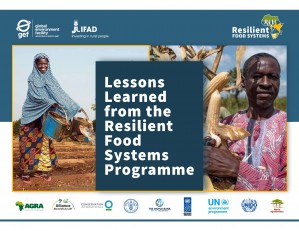
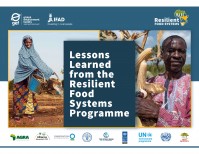
Integrated Approach Pilot (IAP) programmes were conceived as part of the Global Environment Facility (GEF) 2020 Strategy to test the delivery of integrated approaches that address discrete, timebound, complex, global environmental challenges. In its Sixth Replenishment Cycle (GEF6), three IAPs were funded: Sustainable Cities, Taking Deforestation out of Commodity Supply Chains, and Fostering Sustainability and Resilience for Food Security in Sub-Saharan Africa, also known as the Resilient Food Systems (RFS) programme.
The RFS programme serves as an outstanding example of different partners and countries with distinct mandates joining forces to pursue a shared objective, leveraging their respective strengths to transform food systems in Africa. It highlights the significance of clearly articulating the programme’s vision, establishing a well-defined division of labour, and delineating roles and responsibilities from the outset, forming the foundation for an accountability framework. Moreover, the RFS underscores the importance of adopting a nexus approach that integrates food security, agriculture, environment, socio-economic, and climate considerations.
This holistic approach recognizes the interconnectedness of these sectors and the need for holistic solutions. The RFS’s systems-based approach brings together multiple partners at different levels and fosters information flows in both directions, supporting collaboration and knowledge sharing.
This publication presents some of the main lessons learned from the RFS programme, which lasted for six years between 2017 and 2023. It provides a reflection on the implementation, lessons learned, and observations around the key components of the RFS. The programmatic value-add of the RFS and the manner with which it was harnessed during implementation is conveyed through case studies drawn from the experience of the country projects across these components.
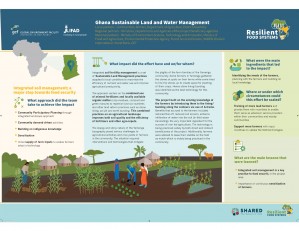
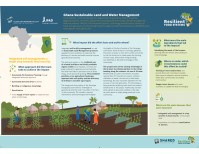
The 2022 Resilient Food Systems Knowledge Exchange and Learning Workshop included an interactive experience-sharing wall, featuring impact posters across RFS countries and components of the Regional Hub.
This poster was prepared by the Ghana Sustainable Land and Water Management project.
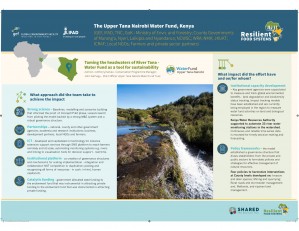
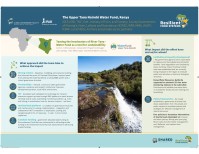
The 2022 Resilient Food Systems Knowledge Exchange and Learning Workshop included an interactive experience-sharing wall, featuring impact posters across RFS countries and components of the Regional Hub.
This poster was prepared by the Upper Tana Nairobi Water Fund, Kenya.